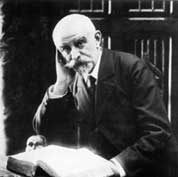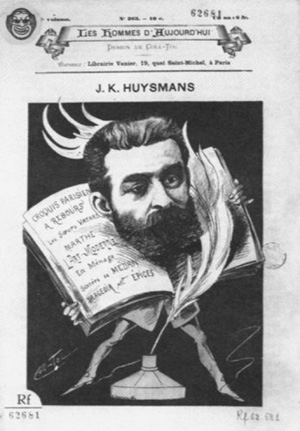J.-K. Huysmans (1848-1907)
J.K. Huysmans was the most visible representative of the Decadent movement in France. He began his career as a writer as a discipline of Emile Zola, and he copied his mentor's concern with detailed presentations of the underside of everyday life. In the 1880s he began what was apparently intended to be an orthodox work of naturalism, describing a very neurotic descendent of a once-great aristocratic family. But by the time that he finished A rebours (usually translated as Against Nature) in 1884, he had obviously taken a very different direction than Zola would ever have considered. He became obsessed with the efforts of his protagonist, des Esseintes, to escape into a world of pure art, in which every aspect of life became an artificial, aesthetic ritual. In the process the work became the most striking example of a new literature that revelled in a certain aesthetic decadence, and it had a great influence on later writings, most visibly in Oscar Wilde's The Picture of Dorian Gray.
a writer as a discipline of Emile Zola, and he copied his mentor's concern with detailed presentations of the underside of everyday life. In the 1880s he began what was apparently intended to be an orthodox work of naturalism, describing a very neurotic descendent of a once-great aristocratic family. But by the time that he finished A rebours (usually translated as Against Nature) in 1884, he had obviously taken a very different direction than Zola would ever have considered. He became obsessed with the efforts of his protagonist, des Esseintes, to escape into a world of pure art, in which every aspect of life became an artificial, aesthetic ritual. In the process the work became the most striking example of a new literature that revelled in a certain aesthetic decadence, and it had a great influence on later writings, most visibly in Oscar Wilde's The Picture of Dorian Gray.
 Below you will find links to passages from A rebours.
Below you will find links to passages from A rebours.